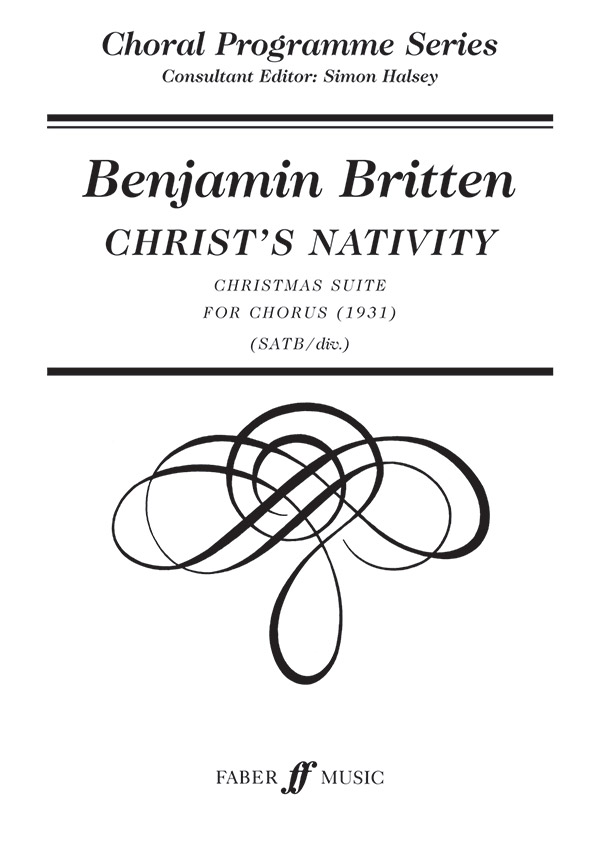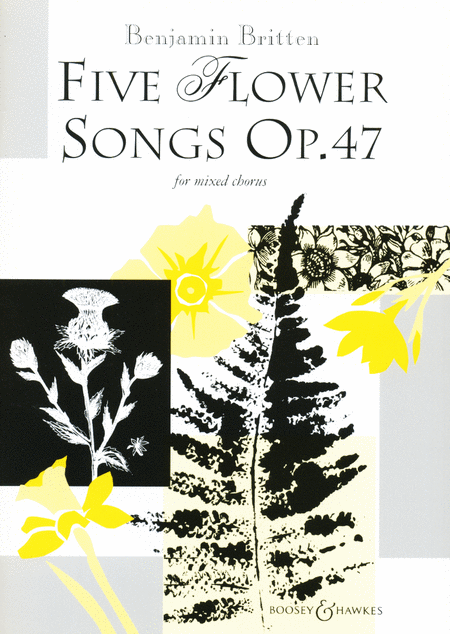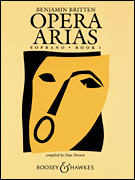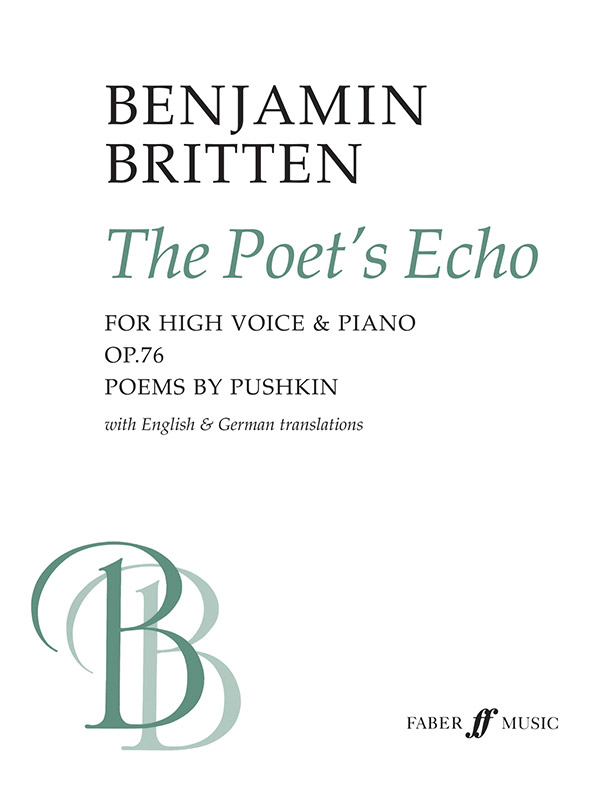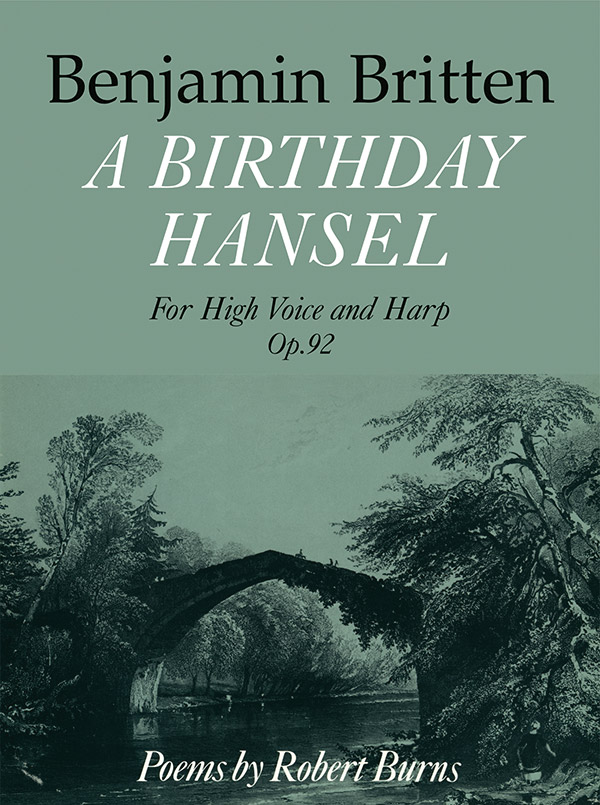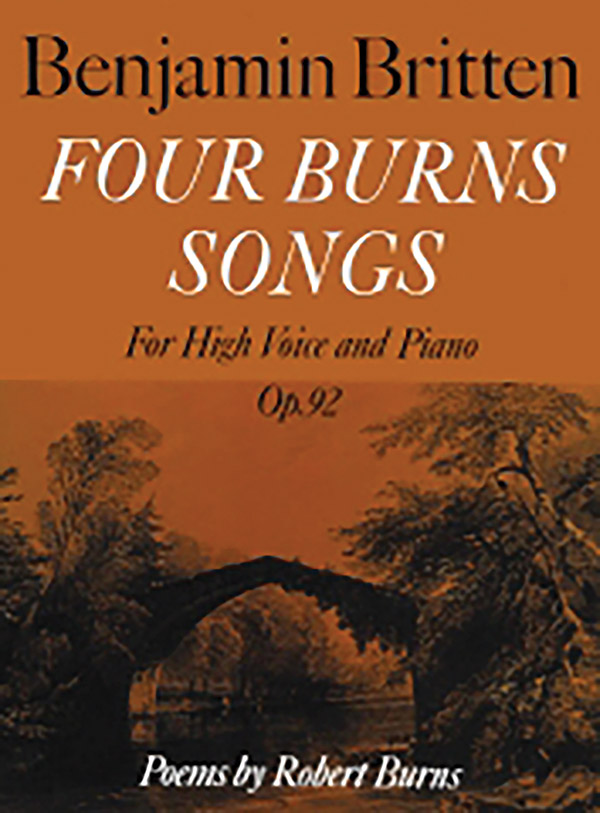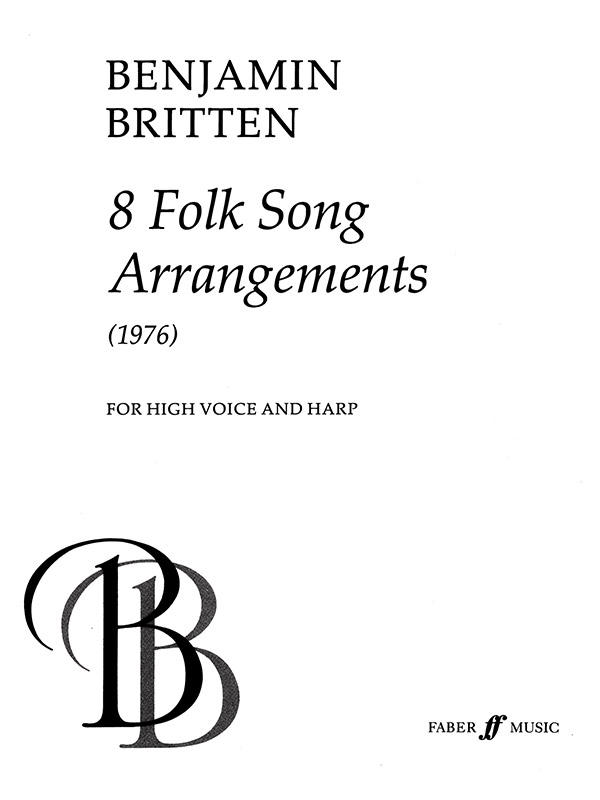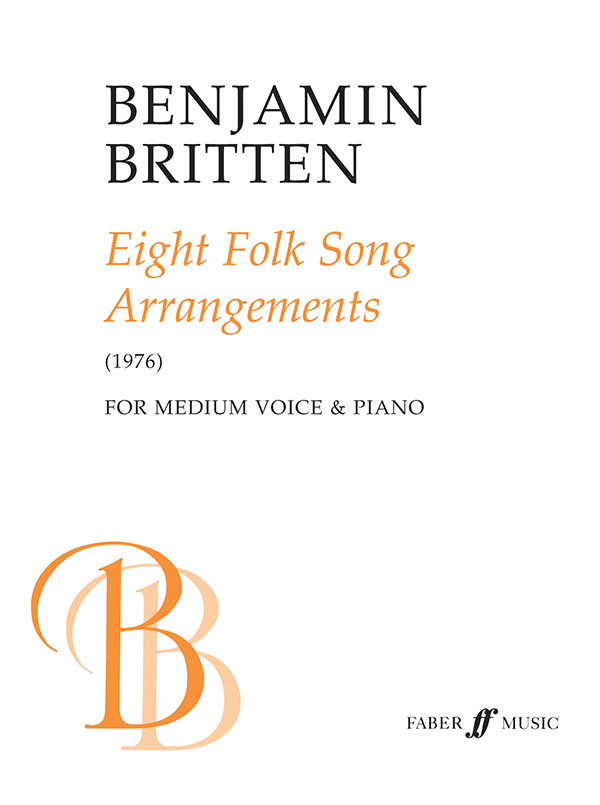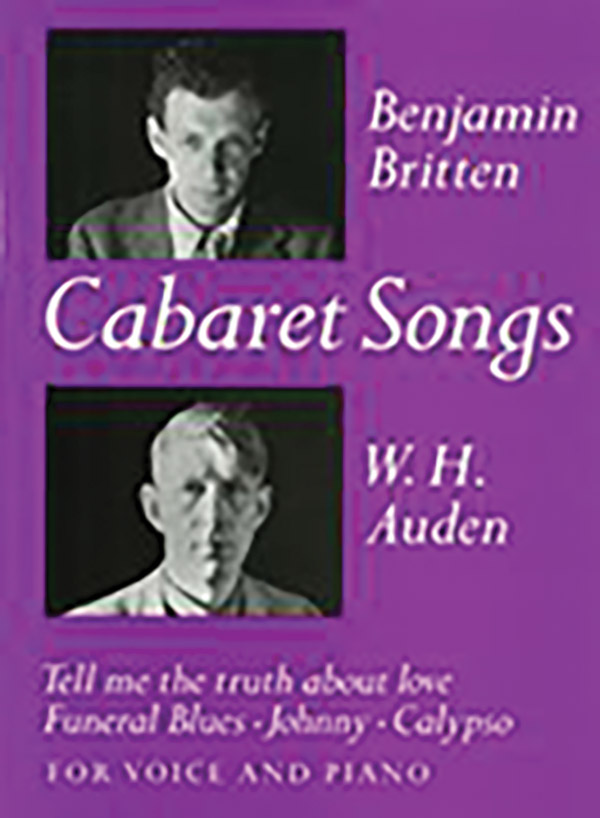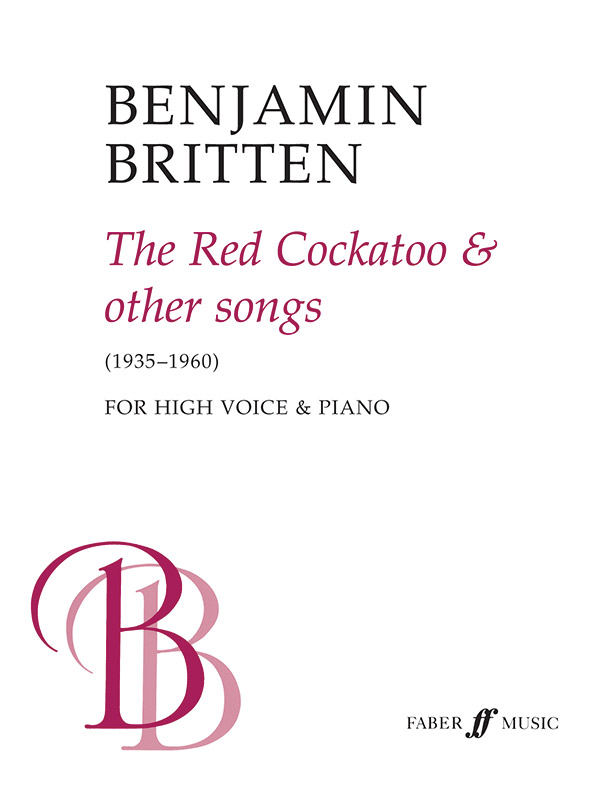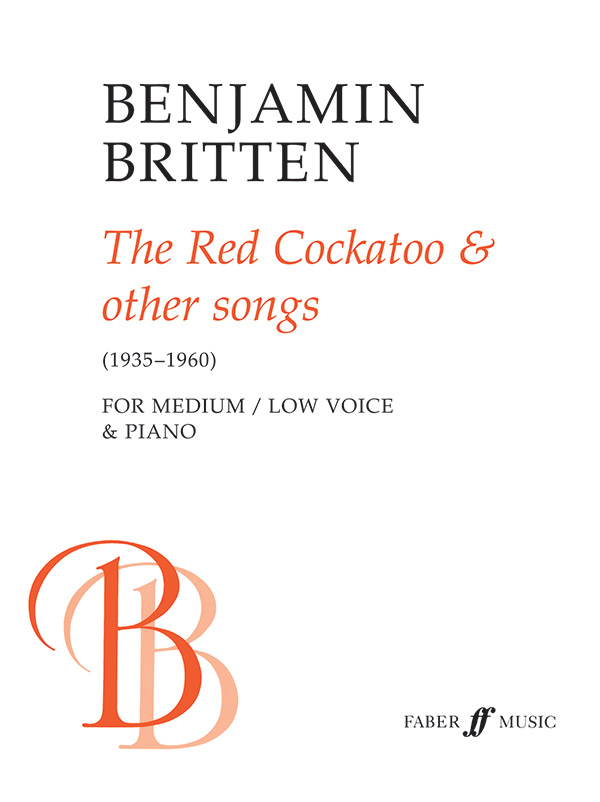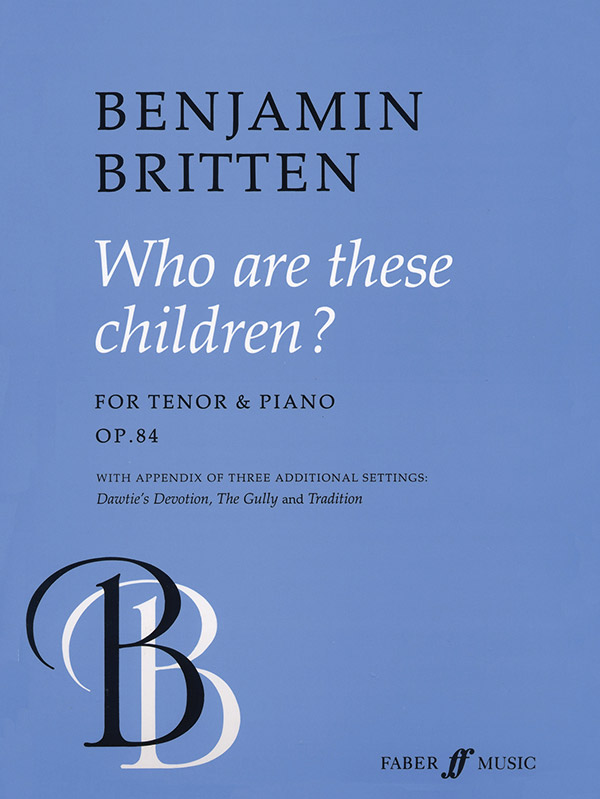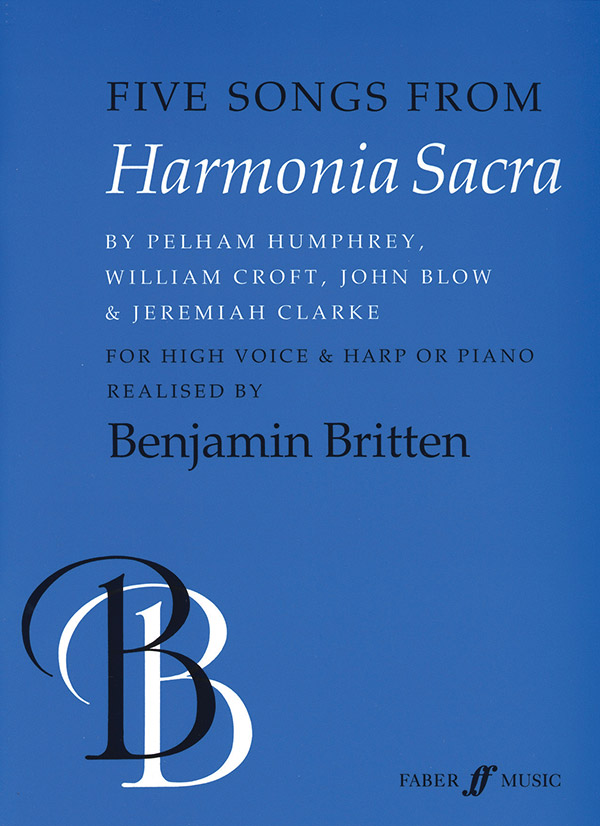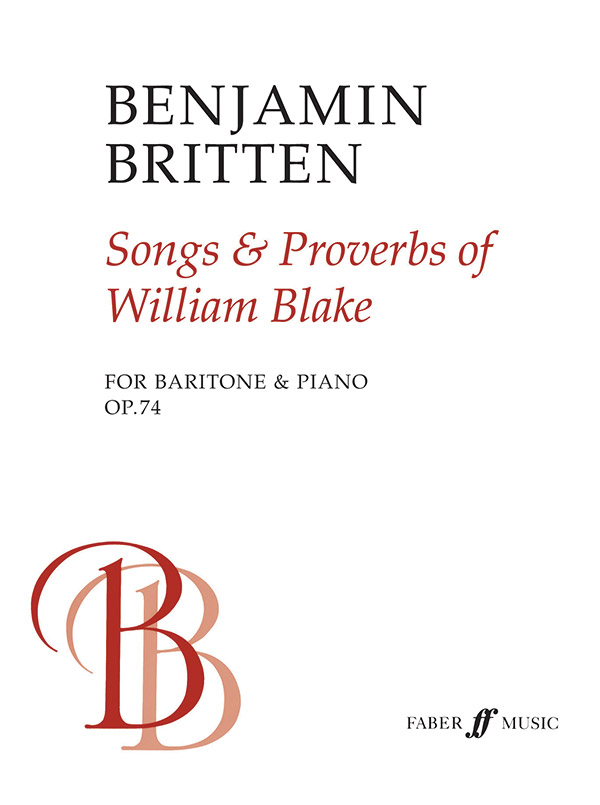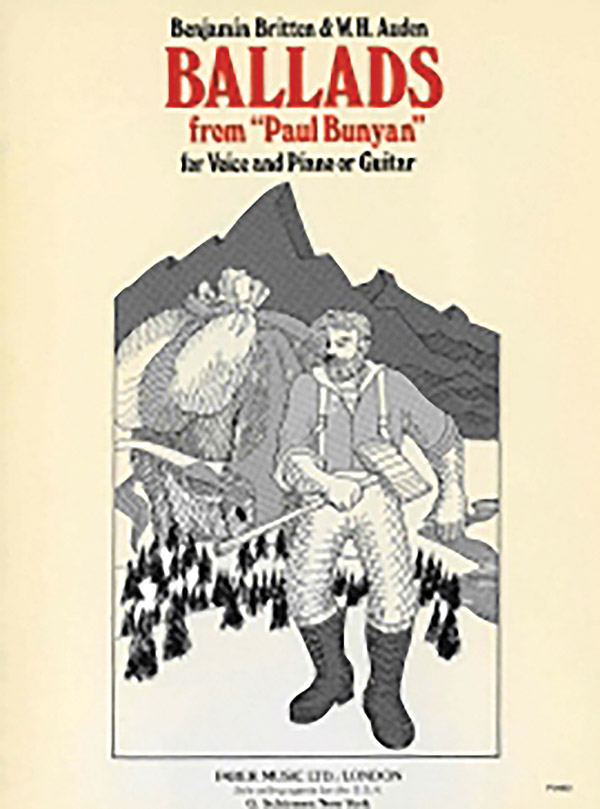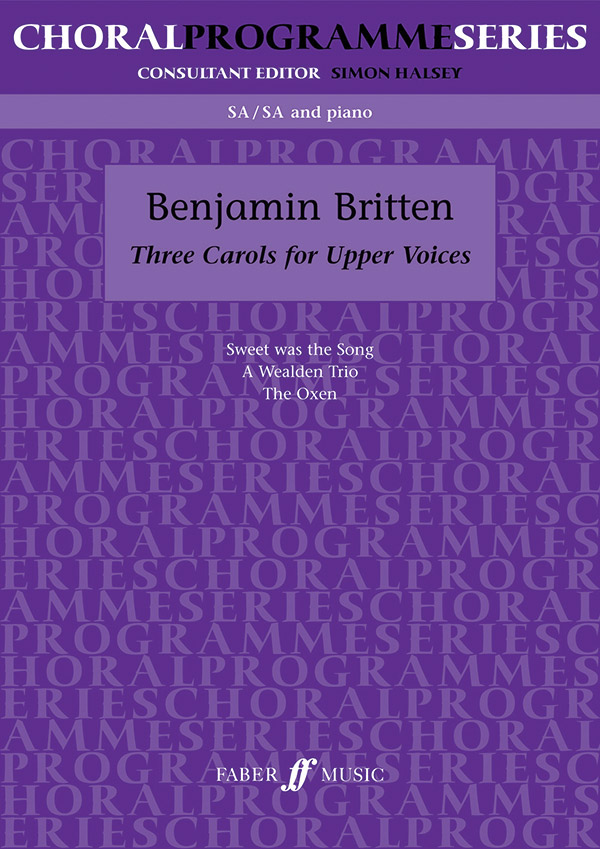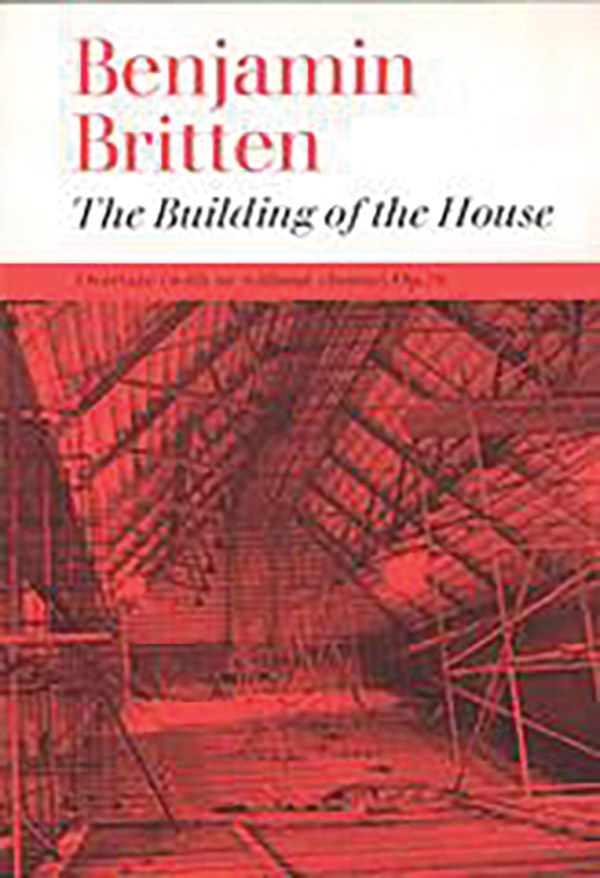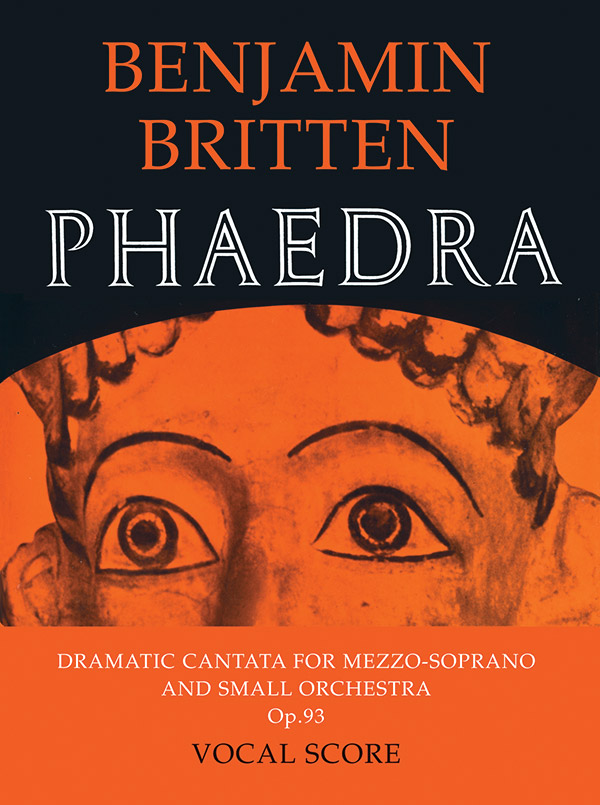In Celebration of the Human Voice - The Essential Musical Instrument
Home | Doo Wop | Barbershop | World | Contemporary | Christian | Vocal Jazz | Choral | Christmas | Instructional | Arrangements
Classical | Opera | Musicals | Personality | Young Singers | Disney | Videos | Songs | The Artists

Benjamin Britten
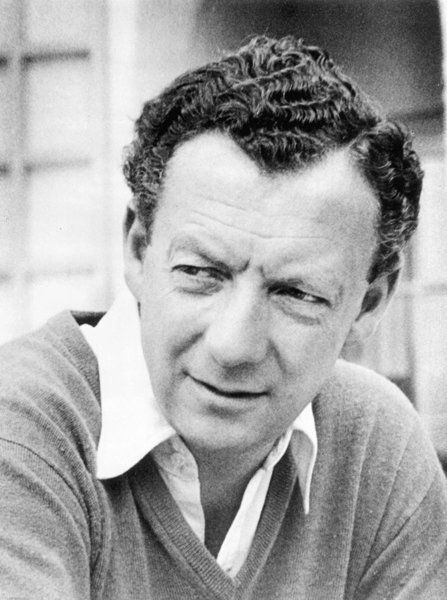
The renowned English composer, who was also a gifted conductor and pianist, Benjamin (Edward) Britten, studied with Frank Bridge as a boy and in 1930 entered the RCM. In 1934 he heard Wozzeck and planned to study with Alban Berg, but opposition at home stopped him. The next year he began working for the GPO Film Unit, where one of his collaborators was Auden: together they worked on concert works as well, Auden's social criticism being matched by a sharply satirical and virtuoso musical style (orchestral song cycle Our Hunting Fathers 1936). Igor Stravinsky and Gustav Mahler were important influences, but Britten's effortless technique gave his early music a high personal definition, notably shown in orchestral works (Bridge Variations for strings, 1937; Piano Concerto, 1938; Violin Concerto, 1939) and songs (Les illuminations, setting Rimbaud for high voice and strings, 1939). |
Arrangements | Recordings
Songbooks, Arrangements and/or Media
Displaying 1-34 of 34 items.
Benjamin Britten : Christ's Nativity A perfect example of the young Britten's masterful vocal writing in a Christmas choral suite destined to become a major repertoire work. Songlist: Christ's Nativity, Sweet was the Song, Preparations, New Price, New Pomp and Carol of King Cnut. Benjamin Britten : Five Flower Songs Both beautiful and inspiring words and music with these delightful songs. Songlist: To Daffodils, The Succession of the Four Sweet Months, Marsh Flowers, The Evening Primrose, Ballad of Green Broom Benjamin Britten : Choral Dances from Gloriana At the opening of Act 2 of Gloriana, Queen Elizabeth 1 is on a state visit to Norwich. After a formal address of welcome she is entertained by a Masque. To these unaccompanied Choral Dances, dancers representing Time and Concord, country girls and young rustics and fishermen all pay homage and tribute to the Queen Songlist: Time, Concord, Time and Concord, Country Girls, Rustics and Fishermen, Final Dance of Homage Benjamin Britten : A Ceremony of Carols - SSA Written for SSA voices and harp (or piano), this popular Christmas choral collection is perfect for your holiday concert. Songlist: Procession, Wolcom Yole, There Is No Rose, The Yonge Child, Balulalow, As Dew In Aprille, This Little Babe, Interlude, In Freezing Winter Night, Spring Carol, Deo Gracias, Recession, Spring Carol Benjamin Britten : A Ceremony of Carols Written for SATB voices and harp (or piano), this popular christmas choral collection is perfect for your holiday concert. Songlist: Procession, Wolcom, Yole, There Is No Rose, The Yonge Child, Balulaow, As Dew In Aprille, This Little Babe, Interlude, In Freezing Winter Night, Spring Carol, Deo Grcias, Recession, Spring Carol Benjamin Britten : Opera Arias - Book 1 - Soprano  Contents: Embroidery Aria (from Peter Grimes) - Glitter of Waves (from Peter Grimes) - I'm Full of Happiness (from Albert Herring) - Is This All (from Albert Herring) - Let Her Among You (from Peter Grimes) - Now Then! Notebook! (from Albert Herring) - She Sleeps As a Rose (from Rape of Lucretia) - Time Treads Upon Hands (from Rape of Lucretia) - Tis Safe For Kings (from Gloriana). Songlist: LET HER AMONG YOU WITHOUT FAULT, EMBROIDERY ARIA, GLITTER OF WAVES AND GLITTER OF SUNLIGHT, NOW THEN! NOTEBOOK, FLORENCE!, IS THIS ALL YOU CAN BRING?, I'M FULL OF HAPPINESS, SOLILOQUY AND PRAYER, SHE SLEEP AS A ROSE, TIME TREADS UPON THE HANDS OF WOMEN Benjamin Britten : Opera Arias - Book 2 - Soprano  Contents: Run, Poor Sweep Boy! (from The Little Sheep) - Soon the Coach Will Carry You Away (from The Little Sweep) - The Journey - Nearly There (from The Turn of the Screw) - Lost in My Labyrinth (from The Turn of the Screw) - Go to Sleep, My Dolly Dear (from The Turn of the Screw) - Come, Now a Roundel (from A Midsummer Night's Dream) - Be Kind and Courteous (from A Midsummer Night's Dream) - Injurious Hermia (from A Midsummer Night's Dream). Songlist: RUN, POOR SWEEP BOY!, SOON THE COACH WILL CARRY YOU AWAY, JOURNEY, THE - NEARLY THERE, TOWER, THE - HOW BEAUTIFUL IT IS, LOST IN MY LABYRINTH, GO TO SLEEP, MY DOLLY DEAR, COME, NOW A ROUNDEL, BE KIND AND COURTEOUS, INJURIOUS HERMIA Benjamin Britten : The Poet's Echo Titles: Echo * My Heart * Angel * The Nightingale and the Rose * Epigram * Lines written during a sleepless night Songlist: Echo, My Heart, Angel, The Nightingale and the Rose, Epigram, Lines written during a sleepless night Benjamin Britten : Birthday Hansel, Opus 92 These songs were written at the special wish of Her Majesty the Queen for her mother's seventy-fifth birthday, August 4th 1975. Its first public performance was given on the 9th January 1976, at Schloss Elmau in Germany by Osian Ellis and Peter Pears. The collection of pieces are intended for High Voice and Harp. The poems for which the music was written for are by Robert Burns. Benjamin Britten : Four Burns Songs, Opus 92 These four songs are taken from A Birthday Hansel Op.92 which was written at the special wish of Her Majesty The Queen for her mother's seventy-fifth birthday, 4th August 1975. All of the songs are wonderfully flowing and expressive and are arranged for High Voice with piano accompaniment. Titles: Afton Water * Wee Willie * The Winter * My Hoggie Benjamin Britten : Eight Folk Songs - High Voice Titles: Lord, I married me a wife * She's like the Swallow * Lemady * Bonny at morn * I was lonely and forlorn * David of the White Rock * The False Knight * Bird Scarer's Song Benjamin Britten : Eight Folk Songs - Medium Voice Titles: Lord, I married me a wife * She's like the Swallow * Lemady * Bonny at morn * I was lonely and forlorn * David of the White Rock * The False Knight * Bird Scarer's Song Benjamin Britten : Cabaret Songs These four fantastic cabaret songs are splendid examples of the genre. They not only provide ample evidence of the composer's and poet's wit and high spirits, but are also wholly characteristic of a particular kind of vernacular music that resulted from the collaboration of two brilliantly endowed young men in the thirties. Arranged for Piano and voice. Titles: Tell me the truth about Love * Funeral Blues * Johnny * Calypso Benjamin Britten : The Red Cockatoo & Other Songs - High Voice A terrific collection that brings together nine of Britten's previously unpublished songs, written over a period of 25 years from 1935 onwards. Many were originally intended to be part of song-cyles but were cut during the final revisions. This edition includes a helpful introduction and information regarding each song. Titles: A Poison Tree * Birthday Song For Erwin * Cradle Song * If Thou Wilt Ease Thine Heart * Not Even Summer Yet * The Red Cockatoo * When You're Feeling Like Expressing Your Affection * Wild With Passion Benjamin Britten : The Red Cockatoo & Other Songs - Low Voice A terrific collection that brings together nine of Britten's previously unpublished songs, written over a period of 25 years from 1935 onwards. Many were originally intended to be part of song-cyles but were cut during the final revisions. This edition includes a helpful introduction and information regarding each song. Titles: A Poison Tree * Birthday Song for Erwin * Cradle Song * If Thou Wilt Ease Thine Heart * Not Even Summer Yet * The Red Cockatoo * When You're Feeling Like Expressing Your Affection * Wild with Passion. Benjamin Britten : Who Are These Children Titles: A Riddle (The Earth) * A Laddie's sang * Nightmare * Black day * Bed-time * Slaughter * A Riddle (The child you were) * The Larky lad * Who are these Children? * Supper * The Children * The Auld Aik * Dawtie's Devotion * The Gully * Tradition Benjamin Britten : Five Songs from Harmonia Sacra Five songs from Harmonia Sacra, for High Voice and Harp or Piano, all realised by Benjamin Britten. Titles: A Hymn on Divine Musick * Lord! I Have Sinned * Hymn to God the Father * A Divine Hymn * Oh! That Mine Eyes Would Melt. Benjamin Britten : Songs and Proverbs of William Blake The first performance of the Songs and Proverbs of William Blake Op.74 was given by Dietrich Fischer-Dieskau and Benjamin Britten at the Aldeburgh Festival on 24 June, 1965. Available here is Britten's fantastic song-cycle of pieces set to the lyrics and proverbs of William Blake, for Baritone Voice with Piano accompaniment. Titles: Proverb I * London * Proverb II * The Chimney-Sweeper * Proverb III * A Poison Tree * Proverb IV * The Tyger * Proverb V * The Fly * Proverb VI * Ah, Sunflower * Proverb VII * Every Night and every morn. Benjamin Britten : Ballads from Paul Bunyan Titles: The Cold Wind Blew * The Spring Came and the Summer Fall * So Helson Smiled and Bunyan Smiled Benjamin Britten : Collected Songs - High Voice 63 songs, with extensive historical introductory notes. Includes all art songs originally composed for voice and piano published by Boosey & Hawkes. The content is the same for the High Voice and Medium/Low Voice volumes, with newly published transpositions as necessary. Contents: The Birds - A Charm of Lullabies (5 songs) - Evening, Morning, Night - Fish in the Unruffled Lakes (6 songs) - The Holy Sonnets of John Donne (8 songs) - On This Island (5 songs) - Sechs Hölderlin Fragmente (6 songs) - Seven Sonnets of Michelangelo) - Songs from the Chinese (6 songs, transcribed for voice and piano) - Three Songs from The Heart of the Matter (with horn) - Winter Words (8 songs plus 2 songs cut from the cycle) - Two Ballads (duets). Songlist: Song, Morning, Nocturne, Dance Song, Prologue, Evening, Epilogue, Seascape, Night, Proud Songsters, The Choirmaster's Burial, The Birds, A Cradle Song, The Highland Balou, Sephestia's Lullaby, A Charm, The Nurse's Song, To Lie Flat On The Back, Night Covers Up The Rigid Land, The Sun Shines Down, Fish In The Unruffled Lakes, What's In Your Mind?, Underneath The Abject Willow, Oh My Blacke Soule!, Batter My Heart, O Might Those Sighes And Teares, Oh, To Vex Me, What If This Present, Since She Whom I Loved, At The Round Earth's Imagined Corners, and more Benjamin Britten : Collected Songs - Medium Low 60 songs, with extensive historical introductory notes. Includes all art songs originally composed for voice and piano published by Boosey & Hawkes. The content is the same for the High Voice and Medium/Low Voice volumes, with newly published transpositions as necessary. Contents: The Birds - A Charm of Lullabies (5 songs) - Evening, Morning, Night - Fish in the Unruffled Lakes (6 songs) - The Holy Sonnets of John Donne (8 songs) - On This Island (5 songs) - Sechs Hölderlin Fragmente (6 songs) - Seven Sonnets of Michelangelo) - Songs from the Chinese (6 songs, transcribed for voice and piano) - Winter Words (8 songs plus 2 songs cut from the cycle) - Two Ballads (duets). Songlist: Morning, Nocturne, Dance Song, Evening, Seascape, Night, Proud Songsters, The Choirmaster's Burial, The Birds, A Cradle Song, The Highland Balou, Sephestia's Lullaby, A Charm, The Nurse's Song, To Lie Flat On The Back, Night Covers Up The Rigid Land, The Sun Shines Down, Fish In The Unruffled Lakes, What's In Your Mind?, Underneath The Abject Willow, Oh My Blacke Soule!, Batter My Heart, O Might Those Sighes And Teares, Oh, To Vex Me, What If This Present, Since She Whom I Loved, At The Round Earth's Imagined Corners, Thou Hast Made Me, Death, Be Not Proud, Let The Florid Music Praise!, and more Benjamin Britten : A Charm of Lullabies, Op. 41 Existing edition of A Charm of Lullabies (BH 5000052) extended by an appendix containing two settings originally intended for the cycle but discarded by the composer: A Sweet Lullaby (Nicholas Breton) and Somnus, the Humble God (John Denham). These two songs were first performed at the 2018 BBC Proms by Sarah Connolly (mezzo-soprano) and Joseph Middleton (piano), and the first recording, by the same performers, is available on Chandos (CHAN10944). The publication includes lyrics with German and French reference translations, plus introduction by Eric Crozier, performance notes by Nancy Evans, and editorial note on the additional songs by Colin Matthews. Benjamin Britten : Complete Folksong Arrangements This landmark publication includes 61 songs, combining the contents of the seven published books of Britten folksong arrangements in High and Low Voice editions. Some of the songs have never before been transposed. The songs of Volume 6, for voice and guitar, have been transcribed for voice and piano for this edition. Editor Richard Walters has done a splendid job of bringing this collection to publication, not only assembling the material but also writing an excellent, informative, and thought provoking Preface that gives insight into Britten's work...Having all these songs together in one volume is a real boon to voice teachers and students alike, not to mention accompanists...All music libraries and voice studios will want to own this collection.--Journal of Singing Benjamin Britten : Complete Folksong Arrangements This landmark publication includes 61 songs, combining the contents of the seven published books of Britten folksong arrangements in High and Low Voice editions. Some of the songs have never before been transposed. The songs of Volume 6, for voice and guitar, have been transcribed for voice and piano for this edition. Editor Richard Walters has done a splendid job of bringing this collection to publication, not only assembling the material but also writing an excellent, informative, and thought provoking Preface that gives insight into Britten's life and work...Having all these songs together in one volume is a real boon to voice teachers and students alike, not to mention accompanists...All music libraries and voice studios will want to own this collection.--Journal of Singing Contents: VOLUME 1: BRITISH ISLES: The Salley Gardens - Little Sir William - The Bonny Earl o' Moray - O Can Ye Sew Cushions? - The Trees They Grow So High - The Ash Grove - Oliver Cromwell - VOLUME 2: FRANCE: La Noel Passee - Voici le Printemps - Fileuse - Le Roi s'en va-t'en Chasse - La Belle est au Jardin d'amour - Il es quelqu'un sur terre - Eho! Eho! - Quand j'etais chez mon pere - VOLUME 3: BRITISH ISLES: The Plough Boy - There's none to Soothe - Sweet Polly Oliver - The Miller of Dee - The Foggy, Foggy Dew - O Waly, Waly - Come you not from Newcastle? - VOLUME 4: MOORE'S IRISH MELODIES: Avenging and Bright - Sail on, Sail on - How Sweet the Answer - The Minstrel Boy - At the Mid Hour of Night - Rich and Rare - Dear Harp of my Country! - Oft in the Stilly Night - The Last rose of Summer - O the Sight Entrancing - VOLUME 5: BRITISH ISLES: The Brisk Young Widow - Sally in Our Alley - The Lincolnshire Poacher - Early One Morning - Ca' the Yowes - VOLUME 6: ENGLAND: I Will Give My Love an Apple - Sailor-boy - Master Kilby - The Soldier and the Sailor - Bonny at Morn - The Shooting of His Dear - EIGHT FOLKSONG ARRANGEMENTS (1976): Lord! I Married Me a Wife - She's Like the Swallow - Lemady - Bonny at Morn - I Was Lonely and Forlorn - David of the White Rock - The False Knight Upon the Road - Bird Scarer's Song - OTHER ARRANGEMENTS: Tom Bowling - The Crocodile - Dink's Song - Greensleeves - The Holly and the Ivy - I Wonder as I Wander - Pray Goody - The Deaf Woman's Courtship - Soldier, Won't You Marry Me? - The Stream in the Valley Benjamin Britten : The World of the Spirit Britten's second 'religious' cantata, The World of the Spirit was written for the BBC radio in 1938. With detailed prefatory notes by Donald Mitchell and Philip Reed. Benjamin Britten : Rejoice in the Lamb, Op. 30 for SATB with SATB solos and organ Imogen Holst orchestrated the work for wind quintet, percussion, organ (ad lib) and strings (1952), and there is also a version for SSAA and organ arranged by Edmund Walters (1966) Text: Christopher Smart Publisher: Boosey & Hawkes Difficulty level: 3 One of Britten's most popular and performed works in this genre, Rejoice in the Lamb was written for the 50th anniversary of St. Matthew's church, Northampton in 1943. The remarkable vicar, Walter Hussey, was a great patron of the arts. His vision for St. Matthew's and later for Chichester Cathedral, where he moved to become Dean, is one of the most fascinating stories in the history of the Anglican Church in the last century.Britten called his work a Festival Cantata and it is structured with choral and solo movements. The text by the supposedly mad Christopher Smart (1722-1771) is part of a poem called Jubilate Agno which he composed in a mental asylum having been committed there by his father-in-law for apparent religious mania. He died in a debtors' prison. It was W.H. Auden who brought the poem to Britten's attention. It is easy to see why Britten was so attracted to Smart's poem. It has great colour, drama, bizarre imagery, and the central issue of the individual against the crowd, or against authority, was one to which Britten was to return repeatedly in his works. Britten had developed a deep interest in Purcell's music at this time and had made keyboard realisations of accompaniments for a number of songs which he performed with Peter Pears. Purcell's influence can easily be heard in the Hallelujah sections. The challenges in this work are many and varied though the difficulty level is not great overall. It is an ideal concert work and is popular with performers and audiences alike. Practical issues include really quiet singing while projecting the voice at the start; dealing with the rhythmic complexities of the first quick section ('Let Nimrod the mighty hunter') and getting the most out of the words and the dynamic contrasts here; the unanimity of the dotted rhythms in the Hallelujah sections; the fielding of four soloists who can put across the character of these zany movements (the cat, the mouse, flowers); the realisation of the depth of passion in the 'For I am under the same accusation as my Saviour' section; the brilliance of the final quick section with all the bizarre musical instrument rhymes; and finally realising the 'stillness and serenity' of the slow music before the final Hallelujah. There is much to consider and much devil in the detail. However, the work is emphatically worth any amount of effort to realise Britten's inspiration. Duration: 17 minutes Paul Spicer, Lichfield, 2011 Benjamin Britten : Saint Nicolas, Op. 42 Cantata for tenor solo, chorus (SATB), semi-chorus (SA), four solo boys, string orchestra, piano duet, percussion and organ Scoring: Piano duet; organ; strings; percussion (Timpani/side drum, bass drum, tenor drum, cymbal, triangle, gong, whip, tambourine) Text: Eric Crozier Publisher: Boosey & Hawkes Difficulty level: 3 Saint Nicolas (note the name has no 'H' in it!) was written for the centenary of Lancing College in Sussex, the independent secondary boarding school on the south coast of England which Peter Pears had attended in his teens. It has a vast chapel intended by its founder, Revd Nathaniel Woodard, as the cathedral for all the schools of his extensive foundation known collectively as 'Woodard' schools. St. Nicolas is famous for many legendary miracles and for being the original 'Santa Claus'. Crozier's libretto is designed to tell the story of his life, to recount some of his most celebrated acts and to give the audience/congregation the opportunity of joining in two beautiful hymns at key moments: 'All people that on earth do dwell' and 'God moves in a mysterious way his wonders to perform'. The narration is all done by the choir, though the tenor sings first-person narratives as well in his role as the mature Nicolas. The young Nicolas is sung by a boy in movement II. There is a dramatic moment at the end of this movement when the boy's voice does a tumble and the tenor proclaims in the voice of Nicolas as a young man: 'God be glorified'. The third movement is an accompanied recitative in which the soloist sings of Nicolas devoting himself to God through the agonies and torment of the many distractions and temptations of life. His faith wins through and he sings a final touching phrase: 'and Love was satisfied'. The sea whips up a storm in the next movement: 'He journeys to Palestine'. It threatens to overturn the ship and drown everyone on board. There is wailing from the sopranos and altos of the semi-chorus and agonised calls from the tenors and basses to 'man the pumps'. Finally, Nicolas begs God to let the storm cease and offers thanks for their safe delivery. Britten creates a palpable sense of relief in the final pages. Benjamin Britten : Friday Afternoons, Op. 7 This set of mainly unison songs for young voices is a gift for a concert of music for upper voices. It is a substantial work taken as a whole but its individual movements are both short and straightforward in their various challenges. Britten wrote the work for the boys of his brother's preparatory school (age 7-13), Clive House, Prestatyn, in Wales to sing. However he encountered a problem with copyright over the use of the Lone Dog. He therefore wrote Begone, dull care to replace it. When these issues were resolved years later the song was included as an appendix item in the 1994 edition. The real beauty of these songs is that Britten never writes down for the children. These are art songs in the best sense of the word and mix both dark and light humour with seriousness and romance to create a little world of changing scenes and emotions. The texts are, as always, carefully chosen to give Britten maximum variety of mood and to challenge and encourage the childrens interest and involvement. The piano parts carry a lot of the responsibility for the creation of mood and atmosphere and ideally need a pianist of reasonable accomplishment to do them justice. In There was a monkey Britten writes an increasingly challenging part which is very effective in making the charged mood rise to its climax. However, he writes an easier alternative part which can be played if the pianist finds the other too difficult. The mixture of texts gives Britten wonderful opportunities for word painting. Songlist: BEGONE, DULL CARE, TRAGIC STORY, A, CUCKOO!, EE-OH!, NEW YEAR CAROL, A, I MUN BE MARRIED ON SUNDAY, THERE WAS A MAN OF NEWINGTON, FISHING SONG, USEFUL PLOUGH, THE, JAZZ-MAN, THERE WAS A MONKEY, OLD ABRAM BROWN, LONE DOG Benjamin Britten : Three Carols These Christmas carols have become contemporary classics. The Serene Sweet Was the Song contrasts with a moving lament on the hardships of Christmas, A Wealdon Trio, and a memorable setting of Hardy's fine poem The Oxen. Songlist: Sweet Was the Song, A Wealden Trio, The Oxen Dr. Richard Cox : The Choral Music of Benjamin Britten: A Conductor's Guide This book by Dr. Richard Cox explores Benjamin Britten's vast choral repertory describing salient features of each work and assessing its accessibility. (260 pages.) Henry Purcell : The Purcell Collection - Realizations by Benjamin Britten Most of Britten's rich Purcell realizations had previously been out fo print for some years. This new edition, with new music engravings and extensive historical notes, includes 9 songs from Harmonia Sacra, 24 solos songs and 6 duets from Orpheus Britannicus, and selections from Dido and Aeneas and The Fairy Queen. Contents: Ah! Belinda, I am prest with torment - Alleluia - The Blessed Virgin's Expostulation - But ere we this perform - Come away, fellow sailors - Dialogue of Corydon and Mopsa - Evening Hymn - Fairest Isle - Fear no danger to ensue - Hark the ech'ing air - How blest are shepherds - I attempt from love's sickness to fly - I spy Celia - I take no pleasure - I'll sail upon the Dog-star - If music be the food of love (1st version) - If music be the food of love(3rd version) - In the black dismal dungeon of despair - Job's Curse - Let sullen discord smile - Lord, what is man - Lost is my quiet - Mad Bess - Man is for the woman made - A Morning Hymn - Music for a while - No, resistance is but vain - Not all my torments - Oft she visits this lov'd mountain - On the brow of Richmond Hill - Pious Celinda - Pursue thy conquest, love - The Queen's Epicedium - Saul and the Witch at Endor - Shake the cloud from off your brow - Shepherd, leave decoying - So when the glittering queen of Night - Sound Fame thy brazen trumpet - Sound the trumpet - Sweeter than roses - Take not a woman's anger ill - Thanks to these lonesome vales - There's not a swain of the plain - Thou tun'st this world - 'Tis holiday - Turn then thine eyes - We sing to him - What can we poor females do? - When I am Laid in earth - Why should men quarrel? Henry Purcell : The Purcell Collection - Realizations by Benjamin Britten Most of the distinctive Purcell realizations by Benjamin Britten, vocal parts edited by Peter Pears, have been out of print for sone years. This new edition collects 49 selections for high voice and 45 selections for medium/low voice. Includes 9 songs from Harmonia Sacra, 24 solo songs and six duets from Orpheus Britannicus, The Queen's Epicedium, and selections from Dido and Aeneas and The Fairy Queen. Contents: Ah! Belinda, I am prest with torment - Alleluia - The Blessed Virgin's Expostulation - But ere we this perform - Dialogue of Corydon and Mopsa - Evening Hymn - Fairest Isle - Fear no danger to ensue - Hark the ech'ing air! - How blest are shepherds - I attempt from love's sickness to fly - I spy Celia - I take no pleasure - I'll sail upon the Dog-star - If music be the food of love (1st version) - If music be the food of love (3rd version) - In the black dismal dungeon of despair - Job's Curse - Let sullen discord smile - Lord, what is man - Lost is my quiet - Mad Bess - Man is for the woman made - A Morning Hymn - Music for a while - No, resistance is but vain - Not all my torments - On the brow of Richmond Hill - Pious Celinda - The Queen's Epicedium - Saul and the Witch at Endor - Shepherd, leave decoying - So when the glittering Queen of Night - sound Fame the brazen trumpet - Sound the trumpet - Sweeter than roses - Take not a woman's anger ill - There's not a swain of the plain - Thou tun'st this world - 'Tis holiday - Turn then thine eyes - We sing to him - What can we poor females do? - When I am laid in earth - Why should men quarrel? |
Displaying 1-19 of 19 items.
Based on Benjamin Britten's opera A Midsummer Night's Dream, Op. 64, this 15-minute choral suite has been arranged and adapted, yet remains true to Britten's original score. The added introductory lines, using words of Shakespeare, help to frame each chorus. This work presents an excellent opportunity for young singers to experience the operatic works of a great twentieth century composer. Duration: ca. 15:00. Performed by Concert Choir of ANIMA, Lauren Sklar, conductor.
Arranger: Lee Kesselman | Poetry By: William Shakespeare | Musical: A Midsummer Night's Dream
for SSAATTBB unaccompanied Text: Randall Swingler Publisher: Boosey & Hawkes Difficulty level: 2 Advance Democracy is a piece of unabashed political propaganda commissioned by the London Co-operative Society. At a time of great anxiety in Europe and on the eve of the second World War, this poem by Randall Swingler paints a dark picture of the threat of dictatorship if democracy doesn't 'rise up and cry that what our fathers fought for well not allow to die'. It is a strange piece and its overtly political message makes it quite difficult to programme except as a curiosity. Britten, however, paints a very clever picture with a long legato line moving constantly through the texture from soprano to bass and back much in the manner which he had used in The Three Kings in A Boy was Born. Around this swirling figure the other parts sing sharply punctuated chords which are full of menace. The final section moves into the major (Britten's brightly flag-waving C major) and the ending is forcefu
Texts: Latin and English Publisher: Boosey & Hawkes Difficulty level: 3 The Ceremony of Carols is one of Britten's best-known and most-performed works. It is a brilliantly conceived and dramatic concert work which sees the voices process to their places singing unaccompanied plainsong and, at the end, processing out again to the same chant. These movements can also be accompanied but strictly only if the voices do not process. The final Alleluia can be repeated as many times as necessary to get the singers to and from their destination.The carols are for three-part children's voices (though, of course they can be sung by female adults as well) and they form a two-part work around a central Interlude for harp which is based on the plainsong from the Procession. Variety is the key word here as all the carols have such individual identities. The forthright Wolcum Yole!, the deliciously lyrical There is no Rose, the swinging Balulalow, the fiery and dramatic This little Babe all contribute
Text: in Latin compiled from the charter of the University, and from older orations in praise of Basle by Bernhard Wyss. Publisher: Boosey & Hawkes Difficulty level: 4 (for chorus) Britten's genius lifts this work above being just a worthy celebration of the 500th anniversary of the foundation of Basle University. It is tongue-in-cheek and mockingly non-academic while referring all the time to academic musical forms and formulae. It is written in two parts (everything is in the statutory Latin including the titles of the parts - Pars I and Pars II). The titles of the movements show Britten's intention to show off a wide variety of techniques. Here are some examples: Chorale/Alla Rovescio (the theme is given and responded to with the same melody upside down)/Recitativo/Tema seriale con fuga/Canone ed ostinato. There is a good deal of humour here. There are seven movements in Pars I and six in Pars II. The tenor soloist is given three florid recitatives, accompanied only by a piano, whic
Text: anon. Publisher: Boosey & Hawkes Difficulty level: 3 The Ceremony of Carols is one of Britten's best-known and most-performed works. It is a brilliantly conceived and dramatic concert work which sees the voices process to their places singing unaccompanied plainsong and, at the end, processing out again to the same chant. These movements can also be accompanied but strictly only if the voices do not process. The final Alleluia can be repeated as many times as necessary to get the singers to and from their destination.The carols are for three-part childrens voices (though, of course they can be sung by female adults as well) and they form a two-part work around a central Interlude for harp which is based on the plainsong from the Procession. Variety is the key word here as all the carols have such individual identities. The forthright Wolcum Yole!, the deliciously lyrical There is no Rose, the swinging Balulalow, the fiery and dramatic This little Babe all contribute to a work whi
Text: Book of Common Prayer: liturgy of Morning Prayer Publisher: Boosey & Hawkes Difficulty level: 2-3 Britten's second setting of the Te Deum is completely different from the C major one he wrote eleven years earlier. It was composed for the centenary Festival of St. Mark's Church in Swindon - an Anglo-Catholic church with a strong choral tradition which continues to this day. The structure of the piece is also different from the earlier work. A lengthy first section in unison which, while carefully notated in a variety of time signatures so that it feels as if it has the freedom of Gregorian chant, is accompanied by static organ chords in a regular 3/4 metre. It is a really imaginative approach, and is actually very simple to perform. While the organ chords continue, the choir breaks up into simple imitative phrases at 'The glorious company of the Apostles praise Thee' but soon returns to the unison lines of the opening. The central section ('Thou art the King of Glory, O Chris't) h
Text: Eric Crozier Publisher: Boosey & Hawkes Difficulty level: 3 Saint Nicolas (note the name has no 'H' in it!) was written for the centenary of Lancing College in Sussex, the independent secondary boarding school on the south coast of England which Peter Pears had attended in his teens. It has a vast chapel intended by its founder, Revd Nathaniel Woodard, as the cathedral for all the schools of his extensive foundation known collectively as 'Woodard' schools. St. Nicolas is famous for many legendary miracles and for being the original 'Santa Claus'. Crozier's libretto is designed to tell the story of his life, to recount some of his most celebrated acts and to give the audience/congregation the opportunity of joining in two beautiful hymns at key moments: 'All people that on earth do dwell' and 'God moves in a mysterious way his wonders to perform'. The narration is all done by the choir, though the tenor sings first-person narratives as well in his role as the mature Nicolas. The y
for unaccompanied SSATB with SSATB solos also version for solo voices Text: W.H.Auden Publisher: Boosey & Hawkes Difficulty level: 4 This work had a long gestation as Britten had problems finding a suitable text. Auden was eventually asked and produced the poem in 1940. Britten's setting was immediately recognised as a major addition to the choral repertory and has since become one of his most enduringly popular choral works. It is a nice coincidence that Britten was born on St. Cecilia's day (22 November). Cecilia is, of course, the Patron Saint of musicians who is supposed to have sung praises to God as she was being martyred. The story of her manner of death makes gruesome reading and the act of singing in extremis something of a miracle! Britten responds to Auden's extraordinary imagery with relish. The poem's division into three 'movements' gives Britten his musical structure, and the provision of a refrain ('Blessed Cecilia, appear in visions to all musicians, appear and inspire.
Text: Robert Southwell Publisher: Boosey & Hawkes Difficulty level: 3 The Ceremony of Carols is one of Britten's best-known and most-performed works. It is a brilliantly conceived and dramatic concert work which sees the voices process to their places singing unaccompanied plainsong and, at the end, processing out again to the same chant. These movements can also be accompanied but strictly only if the voices do not process. The final Alleluia can be repeated as many times as necessary to get the singers to and from their destination. The carols are for three-part children's voices (though, of course they can be sung by female adults as well) and they form a two-part work around a central Interlude for harp which is based on the plainsong from the Procession. Variety is the key word here as all the carols have such individual identities. The forthright Wolcum Yole!, the deliciously lyrical There is no Rose, the swinging Balulalow, the fiery and dramatic This little Babe all contribute
A transcription for SATB chorus and piano of Britten's arrangement of the folk song O Waly, Waly.
Arranger: Richard Walters | Country: England
for male voices (T Bar B) and piano (Britten notes that this should be two pianos if performed by a large chorus) Text: anon: from the Oxford Book of Ballads Publisher: Boosey & Hawkes Difficulty level: 2-3 This work had a curious genesis. Britten's stance as a conscientious objector in World War II is well known but his sympathies for those caught up in its ramifications were as deeply felt as anyone's. Written in the middle of the war years, this ballad was composed 'For Richard Wood and the musicians of Oflag VIIb - Germany'. Wood had organised a music festival at this officers' POW camp at Eichstätt, Bavaria between February and March 1943 and Britten's work was performed at seven of the concerts.The story tells of an unfaithful wife and her lover (Lady Barnard and little Musgrave) being discovered in flagrante delicto and murdered by the cheated husband, Lord Barnard. The music is wonderfully descriptive of the tale beginning with a plodding piano part and the prosaic opening of t
Publisher: Boosey & Hawkes Difficulty level: 5 The Spring Symphony was commissioned by the Koussevitzky Music Foundation and is dedicated to Serge Koussevitzky and the Boston Symphony Orchestra. It was actually premiered at the Concertgebouw, Amsterdam in July 1949 before its American premiere the following month at Tanglewood by its dedicatees. This work is a major undertaking from all points of view. It uses a huge orchestra (complete with cow horn which has to be hired specially), a children's choir which certainly does not have to be composed only of boys, three soloists, and a large SATB chorus which is given very challenging and detailed music to sing. If any work demonstrates the flip side of the Britten coin from Saint Nicolas it must be the Spring Symphony. Here is a seriously intentioned, highly contemporary work for its time which nevertheless shows his predilection for anthologising texts, for creating amazing moments of levity - approaching the humorous episodes in his ope
Text: anon. Publisher: Boosey & HawkesDifficulty level: 3The Ceremony of Carols is one of Britten's best-known and most-performed works. It is a brilliantly conceived and dramatic concert work which sees the voices process to their places singing unaccompanied plainsong and, at the end, processing out again to the same chant. These movements can also be accompanied but strictly only if the voices do not process. The final Alleluia can be repeated as many times as necessary to get the singers to and from their destination. The carols are for three-part children's voices (though, of course they can be sung by female adults as well) and they form a two-part work around a central Interlude for harp which is based on the plainsong from the Procession. Variety is the key word here as all the carols have such individual identities. The forthright Wolcum Yole!, the deliciously lyrical There is no Rose, the swinging Balulalow, the fiery and dramatic This little Babe all contribute to a work whi
Texts: George Wither (I Lov'd a Lass) and Robert Graves (Lift Boy) Publisher: Boosey & Hawkes Difficulty level: 2 These are two delightful and contrasted part-songs for choir and piano which ought to be a gift to choirs looking for rare secular repertoire for their concert programmes. I lov'd a lass is full of fun, while the challenge lies in the regularly changing metre. The choir's first bar is in 7/8 and is followed by 5/4 and then 3/4. Later on Britten gives us 3/4, 7/8, 11/8, 4/4, 5/4, 7/8, 4/4 in successive bars but this all adds to the entertainment. There are lots of portamenti too in what adds up to a passionate little piece. Lift Boy sets a nonsense poem by Robert Graves about a boy who starts life as a knife-boy, moves on to become a lift boy and then a lift man. Preached damnation by 'Old Eagle' one day, he cuts the lift cables and down they all go. But Graves ends by saying: 'Can a phonograph lie? A song very neatly contriv'd to make you and me laugh'. Curious indeed. But
Text: anon. Publisher: Boosey & Hawkes Difficulty level: 3 The Ceremony of Carols is one of Britten's best-known and most-performed works. It is a brilliantly conceived and dramatic concert work which sees the voices process to their places singing unaccompanied plainsong and, at the end, processing out again to the same chant. These movements can also be accompanied but strictly only if the voices do not process. The final Alleluia can be repeated as many times as necessary to get the singers to and from their destination. The carols are for three-part children's voices (though, of course they can be sung by female adults as well) and they form a two-part work around a central Interlude for harp which is based on the plainsong from the Procession. Variety is the key word here as all the carols have such individual identities. The forthright Wolcum Yole!, the deliciously lyrical There is no Rose, the swinging Balulalow, the fiery and dramatic This little Babe all contribute to a work w
![]() Vocal Harmony Arrangements - Home
Vocal Harmony Arrangements - Home
Christian | Gospel | Standards | Musicals | Specialty | World | Barbershop | Contemporary | Vocal Jazz | Choral | Christmas
Mixed Voices | Female | Male | 8 Parts | 6 Parts | 5 Parts | 3 Parts | 2 Parts | Medleys | Solo | Folio Series | New Releases
Select a Category |
Want to Sing? - Find a Chorus Near You
List of Choruses by State | List of Choruses by City

